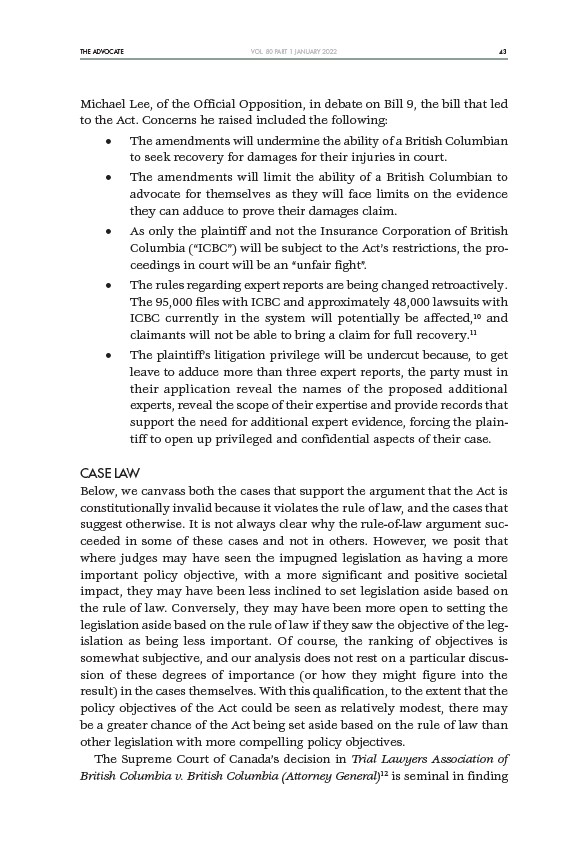
THE ADVOCATE 43
VOL. 80 PART 1 JANUARY 2022
Michael Lee, of the Official Opposition, in debate on Bill 9, the bill that led
to the Act. Concerns he raised included the following:
• The amendments will undermine the ability of a British Columbian
to seek recovery for damages for their injuries in court.
• The amendments will limit the ability of a British Columbian to
advocate for themselves as they will face limits on the evidence
they can adduce to prove their damages claim.
• As only the plaintiff and not the Insurance Corporation of British
Columbia (“ICBC”) will be subject to the Act’s restrictions, the proceedings
in court will be an “unfair fight”.
• The rules regarding expert reports are being changed retroactively.
The 95,000 files with ICBC and approximately 48,000 lawsuits with
ICBC currently in the system will potentially be affected,10 and
claimants will not be able to bring a claim for full recovery.11
• The plaintiff’s litigation privilege will be undercut because, to get
leave to adduce more than three expert reports, the party must in
their application reveal the names of the proposed additional
experts, reveal the scope of their expertise and provide records that
support the need for additional expert evidence, forcing the plaintiff
to open up privileged and confidential aspects of their case.
CASE LAW
Below, we canvass both the cases that support the argument that the Act is
constitutionally invalid because it violates the rule of law, and the cases that
suggest otherwise. It is not always clear why the rule-of-law argument succeeded
in some of these cases and not in others. However, we posit that
where judges may have seen the impugned legislation as having a more
important policy objective, with a more significant and positive societal
impact, they may have been less inclined to set legislation aside based on
the rule of law. Conversely, they may have been more open to setting the
legislation aside based on the rule of law if they saw the objective of the legislation
as being less important. Of course, the ranking of objectives is
somewhat subjective, and our analysis does not rest on a particular discussion
of these degrees of importance (or how they might figure into the
result) in the cases themselves. With this qualification, to the extent that the
policy objectives of the Act could be seen as relatively modest, there may
be a greater chance of the Act being set aside based on the rule of law than
other legislation with more compelling policy objectives.
The Supreme Court of Canada’s decision in Trial Lawyers Association of
British Columbia v. British Columbia (Attorney General)12 is seminal in finding